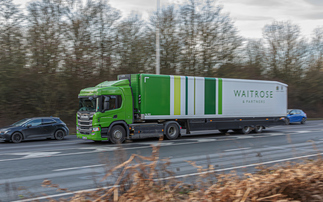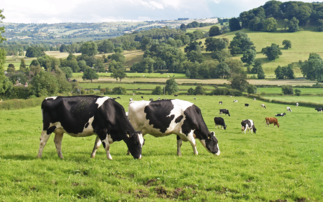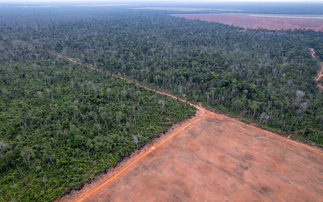Ocean charities hope to replicate the success of Veganuary campaign with new challenge for consumers to consume no fish in February
Across the country, hundreds of thousands of people kicked off the new decade by promising to ditch all animal products for a month.
The Veganuary campaign has taken the country by storm since it was launched in 2014 by husband and wife Jane Land and Matthew Glover. From a small base of just 3,300 participants in the first year, signatories to the campaign have doubled every year to top more than 300,000 in 2020, helped in no small part by Greggs' now famous vegan sausage roll.
Rising interest in plant-based diets has been spurred by a surge in consumer interest in healthy eating and growing public concern over agriculture's climate impact. Only last week the UK government's climate advisors, the Committee on Climate Change, suggested the UK will need to cut meat and dairy consumption by a fifth if the country is to meet its net zero emissions targets, pointing out that the land used for livestock at the moment will be needed for reforestation and other carbon-storing schemes. Critics argued that with demand for red meat already declining, the watchdog should have advocated for an even faster transition away from meat.
But some campaigners believe the public debate on greener diets has been too focused on meat and dairy, allowing the seafood industry to swim on in the shadows. In an effort to redress the balance, this year the Manta Trust, a UK based charity originally formed to protect manta rays, has teamed up with Oceans Festival UK to follow Veganuary with a new campaign - 'Fish-Free February'.
The campaign encourages people to ditch all seafood for the month of February and instead adopt "plant-based, sustainable ways of eating". The Manta Trust claims the campaign - which will use the hashtag #FishFreeFebruary - will "send a clear message of protest against current standards of fishing and seafood farming".
Simon Hillbourne is a marine biologist, digital media and communications manager for the Manta Trust, and creator of the Fish-Free February campaign. Hillbourne says he was moved to launch the campaign so as to address the disconnect between the unsustainable sourcing of much of the seafood sold in the UK and the surge in public focus on the environmental impacts of meat and dairy consumption. "Nobody is really talking about the ocean," he tells BusinessGreen. "In fact, some people were saying, 'I'll swap to eating fish, it's healthier'. [But I thought]: 'Well, hang on a second, the oceans are also in trouble'."
There's certainly a strong environmental argument for reducing the amount of seafood consumed globally. Global seafood consumption - including both seafood consumed by humans and seafood processed for feed - has more than doubled in the past 50 years, to around 22.3kg per capita. In the EU that rises to about 27kg per head. The world's rapacious demand for seafood means that as of 2015, a third of fish stocks are deemed to be fished at unsustainable levels. Just seven per cent of stocks are classified as underfished.
Sustainable fisheries advocates argue eating fish can be a sustainable dietary option as long as the seafood comes from well managed fisheries, a stance also backed by most governments. Only today the UK government introduced its Fisheries Bill to govern management of its fish stocks post-Brexit, which it said promises to ensure fish stocks are managed sustainable and marine habitats thrive once the UK leaves the EU fisheries regime.
Fish-free February acknowledges the need for sustainable management of fisheries and insists its "ultimate goal" is not to stop people eating seafood altogther, but rather to encourage a "radical reduction" in consumption. "We're not pushing for people to stop eating fish forever," Hillbourne says. "Fish is a perfectly viable protein source if it's come from well-managed, small-scale industries. Unfortunately, most of us, especially in the Western world, we can't really go to a small fishmonger just down the road who caught their fish this morning. We rely on going to big supermarkets which rely on big commercial fishing chains."
Moroever, even where governments intend to set fishing on a sustainable path, the problems of keeping track of who is catching what and when is a continual challenge for stock managers. In September 2019 the Marine Stewardship Council (MSC) removed its 'blue tick' sustainability mark from North Sea cod, just two years after it was awarded, after new analysis revealed fish levels were much lower than previously thought.
The situation may be even worse in developing nations, according to the UN. Speaking at a conference in November, the Food and Agriculture Organisation director general Qu Dongyu warned that while fisheries in developed regions are becoming increasingly sustainable, developing regions are struggling to enhance the governance of their own expanding fishing industries. As the most recent update on progress against Sustainable Development Goal 14 - the goal covering life under water - has made clear, the world is a long way from delivering sustainable management of the world's oceans.
Yet despite the parlous state of global fish stocks, and the pressure industrial fishing puts on a marine environment already struggling to deal with warmer ocean temperatures caused by climate change, campaigners are concerned public attention - when it does fall on the oceans - is too preoccupied with plastics.
Ever since Sir David Attenborough presented Blue Planet 2, and the world saw the impacts plastic straws and bags are having on marine life, demand for a dramatic reduction in plastic use has exploded. Major corporates all now have plastic reduction strategies and countries across the world are banning single-use plastics.
But Dr Guy Stevens, CEO and co-founder of the Manta Trust, stresses that fishing and climate breakdown are a far bigger threat to the world's oceans. "I think we have become fixated on plastic reduction because it seems to be something that people can connect too and it's something people feel they have some power over changing," he argues. "But I think it's somewhat of a distraction from these bigger issues."
Alongside Fish-Free February, other NGOs are currently stepping up with new campaigns to refocus government attention on marine climate impacts and overfishing. Yesterday more than 100 environmental organisations, including ClientEarth, Seas At Risk, and WWF, launched a ‘Blue Manifesto' to "turn the tide" on polluted oceans. Plastics - particularly microplastics - are mentioned, but the manifesto focuses much more heavily on addressing overfishing and lobbying for more protected marine areas. Among other measures, it calls for EU countries to adopt policies to drive low-impact fishing by 2030, such as bans on the use of destructive fishing gears and techniques.
"Politicians, policy makers and industry will have to work together and abandon the narrow view of fish as stocks we can over-exploit, and instead consider them as vital parts of complex ecosystems, crucial for ocean resilience," the manifesto reads. "Fish populations need to be restored to a level where they can reproduce safely with a surplus we can harvest."
If Fish-Free February is a success - and Hillbourne "sees no reason" why it can't be as big as Veganuary - then businesses will have a sizeable commercial opportunity to exploit. Just as Veganuary helped to spur massive growth in the market for plant-based foods, so Fish-Free February could deliver a surge in demand for alternative fish products.
Already, the market for fishless foods is showing signs of innovation. This time last year Quorn launched a new range of fish-free products, with CEO Geoff Bryant predicting that seafood-style alternative proteins will become an increasingly important solution for feeding the global population sustainably.
In addition, earlier this week US firm Good Catch launched its plant-based tuna range in the UK. The pea, chickpeas, lentils, soy, and fava bean blend is available in Tesco, with co-found Derek Sarno describing the product as offering a "seafood experience without the sacrifice".
Even fishing giant Thai Union is experimenting with insect proteins to ease demand on fishmeal supply chains, telling BusinessGreen last year that it is also exploring how to use alternative proteins for direct human consumption.
If Fish-Free February takes off, these firms could fast find themselves at the leading edge of a new growth market. So far the campaign is in its infancy, with little under 100 people signed up to its pledge tracker. But the consumer trends suggest a focus on sustainable fish consumption could be poised for major growth, attracting the growing band of 'flexitarians' not quite ready to embrace vegetarianism or veganism in full, but eager to find ways to tweak their diet so as to reduce their environmental impact. Stevens said the campaign should appeal to people not ready to go "cold turkey" in halting consumption of all animal products.
Time will tell whether Fish-Free February will ever mimic the popularity and influence enjoyed by Veganuary. But its a clear reminder for campaigners and companies that sustainable diets don't stop at the shore.










